Photographs: Lee Jae-Won/Reuters
Braving the risk of radiation exposure, emergency workers at the quake-stricken Fukushima nuclear plant on Friday battled to cool the overheating reactors, as Japan sought United States's help to contain the atomic crisis described by the International Atomic Energy Agency as "extremely serious".
The unprecedented cooling mission, launched on Thursday by the Self-Defense Forces by spraying tonnes of water over the plant's No.3 reactor, continued for the second day.
SDF fire trucks shot 50 tonnes of water at a spent fuel pool of the No.3 reactor, a day after military helicopters dumped water in an attempt to prevent a meltdown of fuel rods, Kyodo news agency reported.
'This is the largest crisis for Japan'
Image: US Marines board a KC-130J Super Hercules aircraft to provide assistance to areas in Japan affected by last week's massive earthquake and tsunamiPhotographs: Reuters
The Tokyo Fire Department is also expected to join the operation at the Fukushima nuclear power plant.
"This is the largest crisis for Japan," Prime Minister Naoto Kan said during his meeting with visiting IAEA chief Yukiya Amano, adding that "every organisation (of the government)...is making all-out efforts to deal with the problem."
Soon after arriving in Tokyo, Amano, a Japanese national who was accompanied by a four-member team of nuclear experts, said, "We see it (the nuclear crisis) as an extremely serious accident."
"The international community is extremely concerned about this issue, and it's important to cooperate in dealing with it," he said, adding it was a race against time.
Authorities trying to cool reactors
Image: People queue up to buy gasoline at a village destroyed by the earthquake and tsunami in Ofunato, Iwate PrefecturePhotographs: Lee Jae-Won/Reuters
Chief Cabinet Secretary Yukio Edano, meanwhile, was quoted as saying by the media that the Japanese authorities were coordinating with their US counterparts as to what help Washington "can provide and what people really need."
On the efforts to cool down overheating reactors, Edano said the fire department's trucks may be pressed into action to help douse a spent nuclear fuel pool at the No.1 reactor.
But it does not pose as imminent a threat as the No.3 and No.4 reactors of releasing radioactive material into the air.
Edano said radiation levels near the Fukushima plant "do not pose immediate adverse effects on the human body."
The spent fuel pools at the power station lost their cooling function in the wake of the strong earthquake and devastating tsunami on March 11, which left over 16,000 people dead or unaccounted for.
Reactor cores have partially melted
Image: Volunteers make rice balls for survivors at a shelter in a village destroyed by the earthquake and tsunamiPhotographs: Lee Jae-Won/Reuters
Radiation readings at the troubled nuclear plant consistently followed a downward path throughout Friday morning, according to data taken roughly one kilometre west of the plant's No.2 reactor, Kyodo news agency said.
However, it is not possible to monitor the water levels and the temperatures of the pools in the No.1 to 4 reactors of the plant.
Among the six reactors at the plant, the No.1, No.2 and No.3 reactors that were operating at the time of the quake halted automatically, but their cores are believed to have partially melted as they lost their cooling function after the tremor struck.
90,000 rescue workers looking for survivors
Image: A police officer stands at an area destroyed by an earthquake and a tsunami in Kesennuma city, Miyagi PrefecturePhotographs: Reuters
The confirmed death toll has reached 6,539, exceeding the 6,434 marked in the 1995 Great Hanshin earthquake, the National Police Agency said. The total number of dead and unaccounted for in the largest natural catastrophe in post-war Japan topped 16,000.
Nearly 90,000 rescue workers, including police officers and SDF personnel, have reached some 26,000 survivors so far.
Damaged roads, airports and ports have been gradually repaired, with the Tohoku Expressway now open to emergency vehicles and the submerged Sendai airport made available for airplanes and helicopters on relief missions, Kyodo reported.
21 die after evacuation
Image: A firefighter is seen next to candles during a ceremony for his uncle who was killed in last week's massive earthquake and tsunami in Rikuzentakata, north JapanPhotographs: Kim Kyung-Hoon/Reuters
Meanwhile, 21 people died after being transferred to evacuation centres in Fukushima Prefecture from a hospital in accordance with an official directive issued due to the trouble at the nuclear plant, it said, adding they included elderly patients.
The US, Australia and several European nations asked their citizens in Tokyo and the quake-hit northeast to leave.
The US State Department chartered flights for Americans wishing to move out of the region and allowed its embassy staff and their families to leave the country. Many companies also hired private jets to move their staff out.
G-7 pledges help for Japan
Image: Fire engines in Iwaki city, Fukushima prefecture, prepare to head to Fukushima Daiichi nuclear plantPhotographs: Reuters
Finance ministers and central bank governors from the G-7 -- Britain, Canada, France, Germany, Italy, Japan and the United States -- expressed their "solidarity with the Japanese people" and pledged "any needed cooperation."
They agreed on a coordinated effort to weaken the Japanese Yen, which has surged to record levels following the earthquake and tsunami.
'We express our solidarity'
Image: Caskets containing the bodies of earthquake and tsunami victims are arranged in a hall in Rifu-cho, Miyagi prefecturePhotographs: Reuters
The joint action by the G-7, which came at the request of the Japanese authorities, was the first since September 2010, when they collaborated to prevent the fall in the Euro.
"We express our solidarity with the Japanese people in these difficult times," the G-7 said and noted its "readiness to provide any needed cooperation and our confidence in the resilience of the Japanese economy and financial sector."

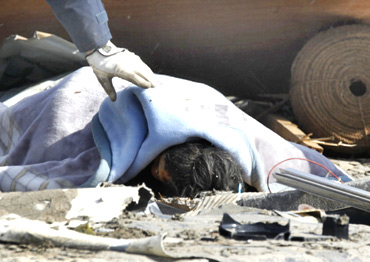
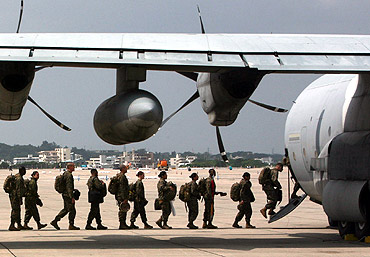
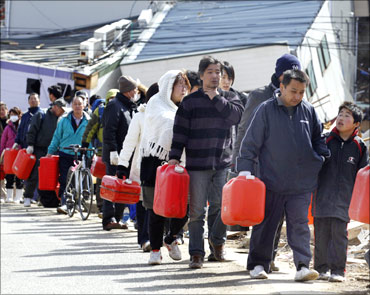

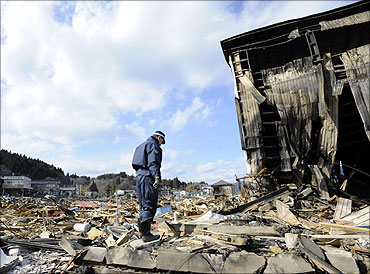
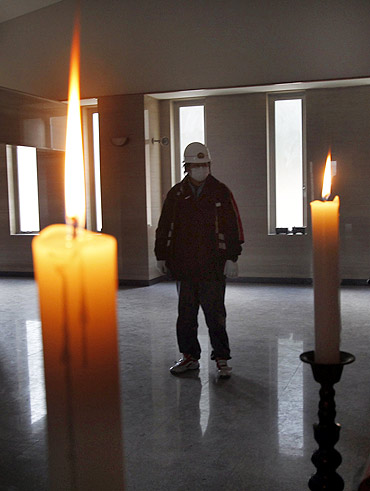
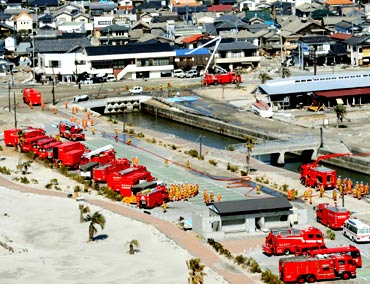
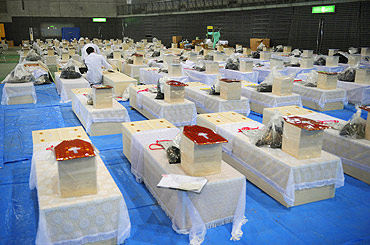
article